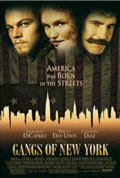
Directed by
Martin Scorsese
165 minutes
Rated MA
Reviewed by
Bernard Hemingway

Gangs Of New York
Synopsis: In the 1860s a young Irish American (Leonardo DiCaprio) returns to his old neighbourhood of Five Points in the slums of New York after 16 years in an orphanage. His purpose is to avenge the murder of his father (Liam Neeson) by William Cutting a.k.a. Bill The Butcher(Daniel Day-Lewis), self-appointed defender of native-born Americans and crime boss. Meanwhile the American Civil War is raging and cruelly dividing the city into rich and poor.Scorsese perplexes me. On the one hand he is a filmmaker's filmmaker, steeped in the history of cinema, with a track record of reflective, if not always successful, projects. On the other hand he's dedicated a large amount of his considerable talents to the depiction of organized thuggery. It's as if he has a voyeuristic fascination with violent aggression, just as Woody Allen has with sex, and exorcises his fixation by projecting it on the screen. But even more problematic for me is that it is a highly aestheticized depiction. Not the cartoon-like treatment of a typical action movie, but an individuated, near-sadistic simulation of the physicality of violence. Gangs Of New York certainly belongs to this group of films. And my personal response is, as always, "What's the point?" .
In this case, and it is well-known that Scorsese has harboured this project for 30 years, the director has seen in this story of New York gang warfare (adapted from a 1927 novel by journalist Hebert Asbury), not just the precusor for the Mafia street wars that he has already extensively dealt with but a mythic, elemental struggle between tribes, a will-to-power struggle that eventually that gave us Imperial Rome and ...Imperial New York. Ergo the final, anachronistic dissolve into pre-9/11 image of New York complete with U2's typically pompous Hands That Built America thrumming on the soundtrack. Has Scorsese (such as he, and not producer Harvey Weinstein, should be held responsible) succeeded in achieving those epic heights? I'd say definitely not. Once Upon A Time In America this is not.
Given the burden of pre-publicity accompanying this film, it was a helluva lot better than I had anticipated, superbly made and the 166 mins just flew by with one cracking set-up after another(the final book-end set-to, however, was disappointingly schematic). The core problem with this film is, I suspect, is that for all its aspirations and Scorsese's directorial prowess, conceptually it's terribly prosaic. Credit here probably should go to the writers, Jay Cocks, Steven Zaillan and Kenneth Lonergan, all who, apparently, worked on the film separately. With DiCaprio on board I couldn't help but feeling that I was watching a rewrite of Titanic with Cameron Diaz providing the Kate Winslet factor. Gangs is very much a diligent run-through of all the set elements of the young-man-who-returns-to-avenge-his-wronged-father story done in a historical pageant role. The Diaz character, is particularly culpable in this respect, serving no purpose other than the obligatory romantic interest. Every one of her scenes could have been cut out without loss.
For Gangs is essentially a gladiatorial contest between DiCaprio's character and that of Daniel Day-Lewis. DiCaprio I found quite effective, baby-faced looks notwithstanding. However, as is universally acknowledged, Daniel Day-Lewis triumphs as Bill the Butcher - strongly reminiscent of the character of Lacenaire from Marcel Carné’s 1945 depiction of the Parisian underworld, Les Enfants Du Paradis, and in appearance, surely modelled on Leonide Massine's character in the Story of Olympia from Powell and Pressburger's Tales of Hoffman (1951) with a little bit of Dicken's Bill Sykes thrown in for good measure. If Gangs is not in itself a must-see, Daniel Day-Lewis has pulled off what Scorsese has not - a memorable cinematic creation.
Want something different?





